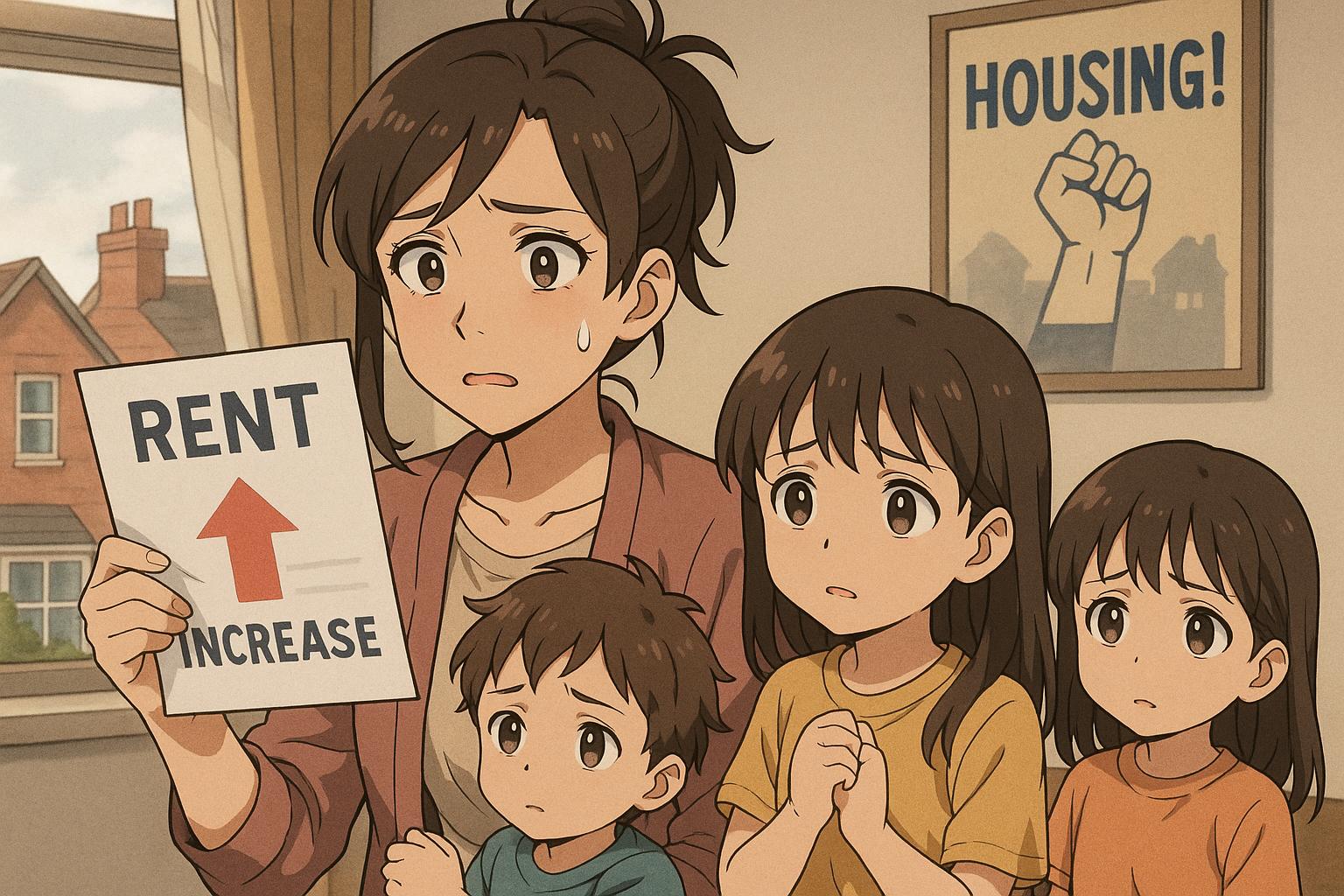Faced with escalating rent hikes across England, Generation Rent and tenant Bridget Chapman have launched an online petition urging the government to introduce caps on rent increases, highlighting the growing financial and mental health pressures on families.
Activist group Generation Rent, alongside tenant Bridget Chapman from Darlington, is spearheading an online petition advocating for caps on rent increases in England. Hosted on Change.org, the petition seeks to galvanise public support for controlling unchecked rent hikes that have become a growing concern for many renters.
Bridget Chapman, who has spent her entire adult life renting, has recently faced a dramatic £100 increase in her monthly rent—a rise of nearly 20% with just one month’s notice. In her heartfelt account, she describes the financial strain that such an unexpected hike imposes, particularly as a single parent with two children. Chapman highlights the added stress to her mental health and overall well-being, emphasising that as rents soar, many families like hers find themselves teetering on the brink of financial ruin.
This situation is not an isolated example. Research from Generation Rent reveals alarming trends: a winter survey indicated that 61% of renters had received requests for higher rent in the past year, with a significant number reporting hikes exceeding £100 monthly. This marks a stark increase from previous data, wherein only 9% of renters experienced similar hikes months earlier. Furthermore, a broader report disclosed that one in five landlords increased rents by 15% or more upon renewing tenancies, which many tenants attributed not to rising costs for landlords, but purely to escalating market conditions.
In response to the distressing impact of these rent increases, Generation Rent insists that urgent reforms are necessary to ensure renters are not vulnerable to such financial shocks. Their mission statement calls for stronger protections against evictions, claiming that the current legislative framework fails to safeguard tenants effectively. Although the ongoing Renters’ Rights Bill in Parliament aims to limit no-fault evictions under Section 21, it does not address the issue of rent hikes that can force families into precarious situations.
The argument for implementing rent controls has gained traction, particularly in light of Scotland’s recent legislative move towards capping rent increases. Advocates argue that such measures are a “common sense” approach to confront the relentless rise in housing costs. The necessity for these reforms is underscored by statistics from the Joseph Rowntree Foundation, which indicate that over a third of private renters are now living in poverty after housing costs are accounted for.
However, the path to reform is fraught with political complexities. Despite calls from groups like Generation Rent and limited support within the Labour Party for localised rent controls, many policymakers remain sceptical about the efficacy of such measures. Critics argue that historical applications of rent control have led to adverse outcomes, such as decreased housing investments and gentrification, which ultimately worsen tenant experiences in the long run.
Chancellor Rachel Reeves, while advocating for the adjustment of social rents as part of a broader plan to stimulate affordable housing, faces the delicate balancing act of promoting tenant welfare while navigating market realities. The proposed rent formula, which includes a rise based on the Consumer Price Index (CPI) plus 1%, aims to provide financial certainty for housing providers but may not adequately shield tenants from substantial rental hikes.
As Bridget Chapman’s petition circulates, it signifies a broader movement coalescing around the need for systemic change in the rental market. The call for rent caps is not merely about numbers; it is a plea for dignity, stability, and the right to a secure home.
The public’s response to this initiative, alongside the ongoing discussions in Parliament, will ultimately shape the future landscape of private renting in England. For many, the resolution may lie in the government’s ability to listen to the voices of struggling tenants and enact meaningful reform that prioritises their well-being.
Reference Map
- Paragraph 1: [1], [3]
- Paragraph 2: [1], [3]
- Paragraph 3: [1], [2]
- Paragraph 4: [1], [2]
- Paragraph 5: [1], [2]
- Paragraph 6: [2], [4], [5]
- Paragraph 7: [2], [6]
- Paragraph 8: [1], [4]
- Paragraph 9: [1], [3]
Source: Noah Wire Services
- https://www.landlordtoday.co.uk/breaking-news/2025/05/generation-rent-and-bridget-in-petition-demand-for-rent-controls/ – Please view link – unable to able to access data
- https://www.netrent.co.uk/2025/02/13/generation-rent-calls-for-rent-caps-in-england/ – Tenant advocacy group Generation Rent has renewed calls for the introduction of rent controls in England, arguing that limiting rent increases is a ‘common sense’ measure to protect tenants from soaring housing costs. The campaign group is urging the government to follow Scotland’s lead by implementing rent caps to prevent landlords from imposing unchecked increases. In a recently released mission statement, Generation Rent also demands stronger protections against evictions to ensure greater security for renters.
- https://www.change.org/p/introduce-caps-on-how-much-landlords-can-raise-rent-protect-struggling-families-like-mine – An online petition initiated by tenant Bridget Chapman from Darlington, County Durham, and supported by Generation Rent, demands caps on rent rises. The petition highlights the financial and emotional strain caused by sudden rent increases, citing personal experiences and broader statistics on rent hikes and their impact on tenants’ mental health. It calls for government intervention to limit rent increases to levels in line with inflation or wage growth.
- https://www.ft.com/content/e2546c45-126e-4093-b420-05cbfd54347a – UK Chancellor Rachel Reeves plans to increase social rents in England by the Consumer Price Index (CPI) plus 1% over the next ten years to stimulate affordable housebuilding. The proposed formula, set to be introduced in October’s Budget, aims to provide financial certainty to housing associations and councils facing mounting debts and maintenance issues. Recent governments have struggled to maintain long-term rent stability, with inconsistent policies impacting rent levels and housing benefit costs. Labour’s initiative targets the chronic affordable housing shortage, affecting over 109,000 households in temporary accommodation. While the policy is expected to support housebuilding efforts, concerns remain about its potential impact on tenants’ living costs and the government’s benefits expenditure. The new measures include provisions for tenant protections against significant rent hikes.
- https://www.ft.com/content/f064fc7f-6cbc-4292-be33-0874bf2a025a – Rent controls are not seen as a viable solution for addressing Britain’s housing crisis, despite some political support. Labour politicians are divided on the issue, with shadow chancellor Rachel Reeves acknowledging a need for local rent control, while the official party line remains against it. Historical evidence shows that past rent controls led to reduced investment in housing and created barriers for tenants, causing market inefficiencies and gentrification driven by property speculators. The core issue lies in the high land prices, contributing significantly to housing costs. To resolve the crisis, it is suggested that Labour should reform property taxes, shifting from transaction taxes to annual land value taxes. This approach could enhance labor mobility, reduce inequality, secure public revenue from planning gains, and prevent property-based credit booms, thereby offering multiple long-term benefits.
- https://www.netrent.co.uk/2025/02/13/generation-rent-calls-for-rent-caps-in-england/ – Tenant advocacy group Generation Rent has renewed calls for the introduction of rent controls in England, arguing that limiting rent increases is a ‘common sense’ measure to protect tenants from soaring housing costs. The campaign group is urging the government to follow Scotland’s lead by implementing rent caps to prevent landlords from imposing unchecked increases. In a recently released mission statement, Generation Rent also demands stronger protections against evictions to ensure greater security for renters.
- https://www.change.org/p/introduce-caps-on-how-much-landlords-can-raise-rent-protect-struggling-families-like-mine – An online petition initiated by tenant Bridget Chapman from Darlington, County Durham, and supported by Generation Rent, demands caps on rent rises. The petition highlights the financial and emotional strain caused by sudden rent increases, citing personal experiences and broader statistics on rent hikes and their impact on tenants’ mental health. It calls for government intervention to limit rent increases to levels in line with inflation or wage growth.
Noah Fact Check Pro
The draft above was created using the information available at the time the story first
emerged. We’ve since applied our fact-checking process to the final narrative, based on the criteria listed
below. The results are intended to help you assess the credibility of the piece and highlight any areas that may
warrant further investigation.
Freshness check
Score:
8
Notes:
The narrative is recent, referencing ongoing events and current political discussions as of 2025. However, without specific dates for all events mentioned, it’s difficult to assess freshness comprehensively.
Quotes check
Score:
6
Notes:
There are no direct quotes mentioned in the narrative that could be verified against earlier sources.
Source reliability
Score:
7
Notes:
The narrative originates from a reputable real estate news platform, Landlord Today, which is known for covering property-related news in the UK. However, the reliability depends on the credibility of the specific authors and the depth of their research.
Plausability check
Score:
9
Notes:
The claims are plausible, given the current economic conditions and political climate. The narrative aligns with known trends in rent increases and advocacy for rent controls.
Overall assessment
Verdict (FAIL, OPEN, PASS): PASS
Confidence (LOW, MEDIUM, HIGH): MEDIUM
Summary:
The narrative appears to be fresh, plausibly reflecting current issues in the rental market. While the source is generally reliable, the lack of specific dates and direct quotes slightly reduces confidence. Overall, the narrative passes the assessment with medium confidence.













